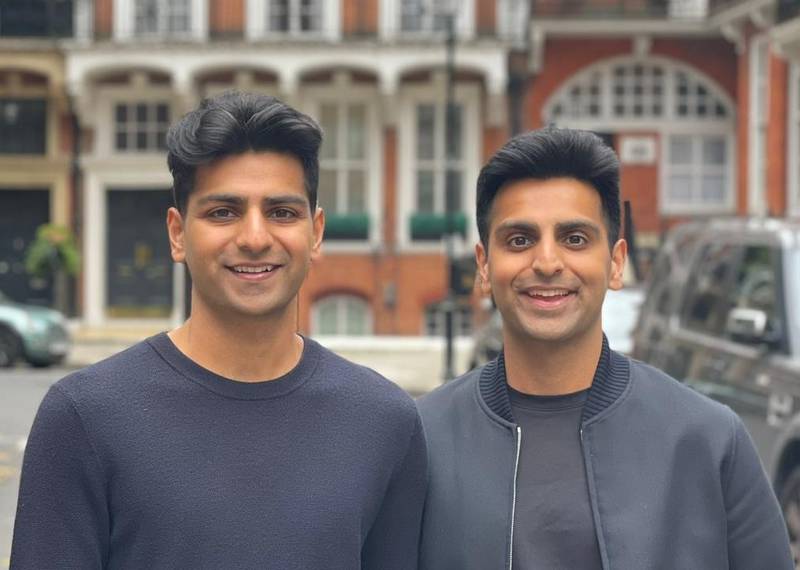From Dubai to Silicon Valley: meet the brothers refining venture capital

In an era that sees venture capitalists flock to Twitter to dispense their wisdom to the masses via threads, newsletters, podcasts and every other conceivable medium, Mohammed and Ammar Amdani – brothers and co-founders of Adapt Ventures, a year-old venture firm with $10 million to deploy and more than 40 investments under its belt – are refreshingly low-key. Their approach to venture is refined. It’s designed not to compete with, but to complement, that of Sequoia’s and a16z’s of the world.
As an early stage start-up, having the backing of a Silicon Valley incumbent is like being handed the keys to a shiny new kingdom where the money is easier to raise, the employees are easier to hire and the customers are easier to sell to. But it can leave “a gap in your needs as a nascent founder,” says Mohammed, who is most often in San Francisco, but both of them move around a lot, they concede.
“If an investor leads your seed round, you only want to put your best foot forward. This restricts you from sharing your vulnerabilities and, usually, vulnerabilities are the things you need to spend more time and attention on.”
Mohammed and Ammar built Adapt Ventures to bridge this chasm. The brothers, 25 and 23, describe Adapt Ventures as a “boutique venture fund;” a fund that cuts smaller cheques but gives founders the space to be transparent about the fissures and threats happening beneath the surface.
Part of Adapt Venture’s appeal lies in Mohammed and Ammar’s authenticity. Instead of conforming to the meme of a Patagonia vest-wearing, Twitter-scrolling VC that bookends each meeting with the strapline 'how can I be helpful' – popularised both in reality by VCs at funds like a16z and in fiction by shows like Silicon Valley – Mohammed and Ammar are actually helpful.
Before they made their first investment in 2020, they spent months supporting founders across the globe, scoping out business development opportunities and channel partnerships without the expectation of any fiscal reward.
Playing a positive sum game yielded results. “Our reputation started to precede us and we began getting an influx of warm introductions to other founders,” says Ammar, largely based in London. As a result, the brothers have hustled their way into exciting deals over the past year – like Matter, a Y Combinator-backed reading app, and PartyRound, a start-up that went viral for paying people $50,000 to quit their jobs and build a company.
Despite their achievements, Mohammed and Ammar’s service-centric ethos remains intact. The stories they tell me of founders feeling comfortable enough to call them at 3am is reinforced by testimonials on Adapt’s website, where words like “friendly” and “humble” are used to describe the brothers by founders across their portfolio.
This act of building goodwill traces back to Mohammed and Ammar’s childhood. The brothers grew up in Dubai against the backdrop of a family business. While their peers raced towards good grades and traditional careers, Mohammed and Ammar tell me they were exposed to an alternative reality: one where it was possible to follow your curiosities.
“Our dad and uncle were always involved in various projects, so we felt that was normal,” says Mohammed. What felt less normal was formalised education. “We were like lunar eclipses,” he laughs. “When we showed up to class, it was a rare sighting. We preferred to learn about things that interested us.”
This interest was channeled into a proliferation of side projects: from Ammar selling imported sweets in the elementary school bathrooms, to Mohammed selling tea out of his dorm room, to both brothers co-founding an e-commerce brand in university. “We built a reputation for each of these things,” says Mohammed. As a byproduct of these entrepreneurial spurts, Mohammed and Ammar bring more than cash and a shoulder to lean on when investing in founders. They bring an understanding that etches deeper than your average investor – one based on the shared experience of how difficult it is to make something out of nothing.
At a time when investors are competing for stakes in companies, Mohammed and Ammar have thought deeply about the art of identifying who to trust. When sifting through pitch decks, the brothers search for founders who are dedicated to solving problems rather than starting companies.
“Some of the best founders are not the most experienced people, but they make up for it by being intellectually curious. They’re willing to go out and absorb as much as they can, and are open to making better decisions based on new information.” When this curiosity is paired with humility, domain expertise, and a great founding team, Adapt Ventures moves quickly. Mohammed and Ammar have gone from initial calls to wired investments in as little as 24 hours.
Throughout our call, Mohammed and Ammar make working with a sibling look easy; they’re in sync, volleying answers back and forth without any of the awkward pauses that usually perforate Zoom conversations. This is the result of a year of trial and error.
“There will always be egos involved when you’re working with family. We’ve had to work on not taking things personally,” says Mohammed. “Venture capital is inherently individualistic and we’re trying to change that. It's not about I did this or he did this. It was only when we started operating through the lens of a team that we saw results.”
I ask whether one day they want to supercharge their growth and morph Adapt Ventures into a gargantuan fund that leads rounds. For now, Mohammed and Ammar tell me they’re happily settled into their niche: a boutique fund supporting interesting people with interesting ideas not just in the US, but outside Silicon Valley too – in the UK, Latin America, India and Indonesia.
